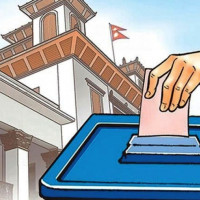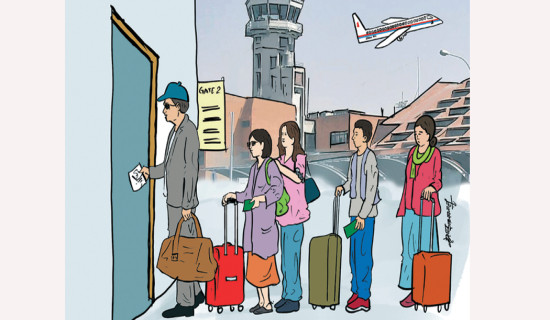- Thursday, 5 February 2026
Meeting demand of female peacekeepers a challenge for Nepal
Kathmandu, Aug. 20: After the United Nations (UN) asked to increase the number and participation of women soldiers for peacekeeping mission in various conflict-hit countries, security sectors of Nepal have faced a challenge to meet the demand.
Member States of the UN have been urged to increase the number of female soldiers in field security to 15 per cent by 2028 and to 25 per cent in supervisors and other personnel.
The present data on the female soldiers participating in the peacekeeping mission has, however, shown that there is a challenge for the Nepali Army to increase the number of women in the army.
The number of Nepali Army is currently around 98,000. Of them, the total number of female soldiers in the force is around 7,000.
According to the Army Headquarters, so far 140,222 Nepali soldiers have participated in 43 peacekeeping missions around the world, including 1,838 female soldiers, which is just 1.31 per cent.
“Today, we have been able to make the presence of female peacekeeping soldiers at just 1.31 per cent and we are committed to increase this figure,” Brigadier General and Spokesperson for the Nepali Army Narayan Silwal said.
Similarly, the NA has now been deploying its 5,466 soldiers in 11 different peacekeeping missions around the world. In which there are 250 female soldiers, and it is 4.57 per cent, said Silwal.
Nepal will have to send a large number of women soldiers on peace missions in the next six years.
Five years ago, the Nepal government had already informed the United Nations about sending 10,000 peacekeepers every year. By December 2021, 7.8 percent of women from countries that send peace troops to peacekeeping missions are working in various fields, according to the record of the Department of Peacekeeping Operation (DPKO) under the UN.
The countries that send more peacekeepers like Bangladesh, Egypt, Ethiopia, Ghana, Rwanda, Senegal, India, Pakistan and other countries have too send more female soldiers.
Recently, the UN Peacekeeping in its twitter had praised the role played by the respective countries regarding women's participation and requested to deploy more women peacekeepers and promote them. Bangladesh, Nepal, Egypt, Ethiopia, Ghana, Rwanda and Senegal have been asked to emphasise the issue.
A male soldier could not get their turn to participate in UN mission even after serving for 15 years. But a female soldier who serves for 15 years gets such opportunity for three times if the number is increased, said a senior officer at the Nepali Army. According to him, once he/she goes on a peace mission, they earn around Rs. 2 million.
The UN has been deploying peacekeepers and observers to conflict-ridden countries since 1948. At the call of the UN, Nepal has started sending Nepalis peacekeepers to conflict-hit countries since 1958. For the first time in 1958, Nepali military observer was assigned to the United Nations Observer Group in Lebanon.
Since 1974, Nepal has deployed a force of Nepali peacekeepers as a contingent.
In 1974, the Purnao Gorakh battalion participated on behalf of Nepal in Egypt under the United Nations Emergency Force. Since then, Nepal has been continuously showing its presence in the UN mission. Currently, the Nepali Army has participated in 11 missions in Congo, South Sudan, Western Sahara, Israel, Lebanon, Mali, Syria, Central African Republic, Iraq and Libya, said Silwal.
Nepal is currently the second largest contributor of troops to the UN. In order to maintain the same situation, Nepal should now emphasise the recruitment of women soldiers, said former Major General Jhankar Kadayat.
Now, if necessary, Nepal should not hesitate to recruit more women soldiers. Looking at the provisions of the UN, it seems that not only Nepal, but other countries also need to recruit more soldiers," he said.
Purna Silwal, another former retired senior general, said that even if the UN doesn’t request Nepal and other countries, we need to discuss the matter and send them to the peace mission. “It is not that we should do as the UN says. But Nepal should increase the number of women peacekeepers as many as possible," he said.

















